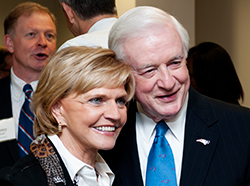U.S. Secretary of Education Arne Duncan, left, Jim Eddy, interim UNCG DCL dean, right, and students from rural high schools across North Carolina show off their NC New Schools caps.
Duncan, U.S. Secretary of Education, was at UNCG Thursday to take part in a forum about the federally-funded N.C. Investing in Rural Innovative Schools initiative, which partners with UNCG’s iSchool for online courses. That’s when Duncan announced the Department of Education will add $20 million to its earlier $15 million investment in N.C. Rural Schools, which offers students in remote areas of the state early college credit and prepares them for college and the workforce.
“I get to feel like Santa Claus today,” Duncan said, calling the funds “not a gift, but an investment.” He said N.C. Rural Schools earned that additional investment by showing tangible, real-world results.
N.C. New Schools, the public-private partnership that administers the funds, launched the program with a pilot group of five rural high schools in 2012-13 school year. During that first year, the schools’ combined drop-out rate fell by nearly a third. The pilot schools counted 38 fewer drop-outs than in the previous school year.
“It’s not just about college credit, this is about changing lives,” Duncan said. “In some cases it’s about saving lives.”

Eric Trejo, an East Surry High School student and aspiring civil engineer, is just one example of the positive impact of N.C. Rural Schools. Trejo introduced Duncan to the crowd of about 200 people gathered in UNCG’s Elliott University Center — a crowd that included former N.C. Governors Beverly Perdue and Jim Hunt and Maurice “Mo” Green, Guilford County Schools superintendent.
Trejo is the son of Mexican parents who left school by the eighth grade. He will be a first-generation college student, hopefully, he said, in UNC-Charlotte’s engineering school.
“My father, whom I admire very much, made the best of what he had,” Trejo told the crowd. “Think of what we can do.”
Another student in the program, Antonio Ramos from Warren County High School, told a similar story.
“None of my family finished high school, and none of them had even thought about going to college,” he said. “I want to be a role model for my sister, not to follow but to be a leader.”
N.C. Rural Schools — funded by the federal grants, private donations, and state support — currently works with 18 rural North Carolina High Schools in Alleghany, Beaufort, Bladen, Hertford, Jones, Madison, Martin, Rutherford, Surry, Warren and Yancey counties. The goal is for each school to increase its graduation rate by 10 percent and reduce its dropout rate by 10 percent over three years, and for students to complete six or seven college courses.
Jim Eddy, interim dean of UNCG’s Division of Continual Learning, said iSchool students appreciate the flexibility of online classes that allow them to complete assignments or view materials at any hour. Eddy said studies suggest iSchool students learn about 25 percent more content that other learners. About 70 percent of them earn A’s or B’s in their classes, he said.
Students in those school can earn as many as 21 college credit hours, tuition free, by the time they graduate high school. UNCG’s iSchool and East Carolina University’s Second Life Virtual Education provide online classes while local community colleges provide in-person classes.
UNCG Chancellor Linda P. Brady said iSchool generated more than 15,000 registrations and more than 41,000 transferable college credit hours between 2007 and 2011. Brady added that North Carolina remains “an education state.”
Tony Habit, president of N.C. New Schools, agreed with Brady that North Carolina is at the forefront of new movements like online learning. “We, as North Carolinians, are quickly becoming the Innovative State.”
Reposted from UNCG News & Features
Story by Michelle Hines, University Relations
Photos by Daniel Smith, Division of Continual Learning
